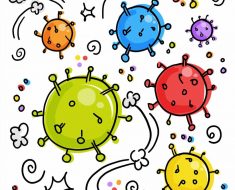Antibodies aren't the only immune cells needed to fight off COVID-19 -; T cells are equally important and can step up to do the job when antibodies are depleted, suggests a new Penn Medicine study of blood cancer patients with COVID-19 published in Nature Medicine. The researchers found that blood cancer patients with COVID-19 who had higher CD8 T cells, many of whom had depleted antibodies from cancer treatments, were more than three times likelier to survive than patients with lower levels of CD8 T cells.
It's clear T cells are critical in terms of the early infection and to help control the virus, but we also showed that they can compensate for B cell and antibody responses, which blood cancer patients are likely missing because of the drugs. This is important when we think about how to improve the care of cancer patients with COVID. We need to maximize all the arms of the immune system, especially if we know that one particular arm of the immune system is down."
Alexander C. Huang, MD, Study Co-Senior Author and Assistant Professor of Hematology-Oncology, Perelman School of Medicine, University of Pennsylvania and Penn's Institute of Immunology
Additionally, because the current COVID-19 mRNA vaccinations induce both antibody and T cell responses, the findings suggest that vaccination of blood cancer patients could provide protection through T cell immunity, despite the absence of antibodies.
The team-;which included researchers from Memorial Sloan Kettering Cancer Center-;studied hospitalized patients with both solid tumors and hematologic cancers admitted to four Penn Medicine hospitals and Memorial Sloan Kettering to better understand the immune determinants of COVID-19 deaths.
Supporting previous studies, patients with blood cancer were more likely to die from COVID-19 than patients with solid tumors or without cancer. Out of 100 patients admitted to Penn Medicine hospitals, 22 had a blood cancer diagnosis and were 2.6 fold more likely to die compared to patients with solid cancer, the authors found.
Immune profiling of 214 patient blood samples at Memorial Sloan Kettering and Penn Medicine revealed that patients with blood cancers, in particular patients treated with anti-CD20 antibodies, had decreased B cells and antibodies compared to patients with solid cancers and patients without cancer. Additional analyses also revealed that among patients with blood cancers, including patients treated with chemotherapy and anti-CD20 antibodies, those with higher CD8 T cell counts had a 3.6 fold greater likelihood of survival compared to those with lower counts.
Thus, the authors concluded, CD8 T cells may influence recovery from COVID-19 when B cells and antibodies are deficient.
"As a clinician, this work can help us advise patients while we wait for more vaccine specific studies to be published," said first author Erin Bange, MD, a fellow in the division of Hematology-Oncology and Penn Center for Cancer Care Innovation. "We can inform patients that while their vaccine response likely will not be as robust as their friends/family who don't have blood cancers, it is still critical and potentially lifesaving."
The next step is to better understand the immune responses blood cancer patients with COVID-19 experience after they recover and how protective their immunity is without B cells and antibodies, the researchers said.
University of Pennsylvania School of Medicine
Posted in: Medical Research News | Medical Condition News | Disease/Infection News
Tags: Antibodies, Antibody, Blood, Blood Cancer, Cancer, Cancer Diagnosis, Cell, Chemotherapy, Drugs, Education, Health Systems, Hematology, Hospital, Immune System, Immunology, Immunotherapy, Leukemia, Lymphoma, Medical School, Medicine, Oncology, Research, Vaccine, Virus
Source: Read Full Article





